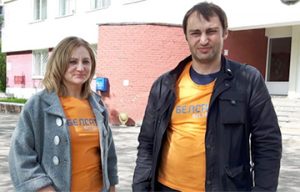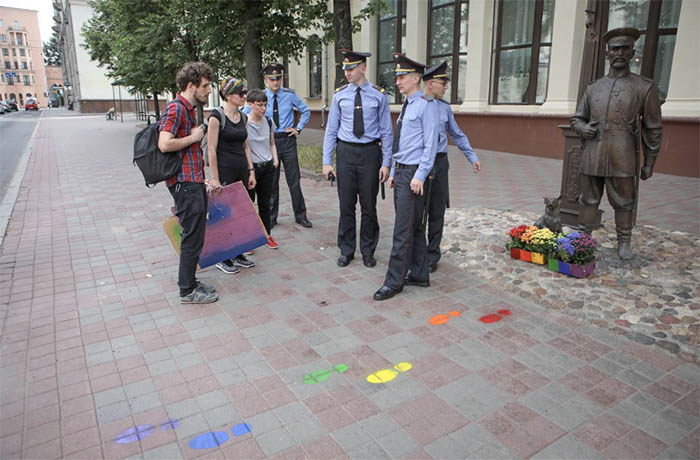Index relies entirely on the support of donors and readers to do its work.
Help us keep amplifying censored voices today.
[vc_row][vc_column][vc_column_text]
[/vc_column_text][/vc_column][/vc_row][vc_row][vc_column][vc_row_inner][vc_column_inner][vc_custom_heading text=”5 Incidents” use_theme_fonts=”yes”][vc_column_text]

Zmitser Kazakevich and Viachaslau Lazarau
26 June 2019 – Vitsebsk independent journalists Zmitser Kazakevich and Viachaslau Lazarau were not allowed to cover a roundtable discussion between education officials and the parents of individuals convicted of drug offenses.
The journalists were told they could not be present at the event because they were not listed as invitees. Officials turned down a request from the organisers that the press be allowed to attend.
Link: https://baj.by/be/content/vicebskih-zhurnalistau-ne-puscili-na-krugly-stol-pa-prableme-narkotykau
Category: Blocked Access
Source(s) of violation: State Agency
12 June 2019 – Media professionals were barred from attending a meeting between Anatol Lis, head of the Brest regional government, and environmental protestors. Three independent journalists had been included in a list of meeting participants. Audio recording and photographing during the meeting were banned.
Link: https://charter97.link/ru/news/2019/6/13/337549/
Category: Blocked Access
Source(s) of violation: State Agency
11 June 2019 – Management of a controversial battery plant I-Power blocked some independent media representatives and bloggers from attending a press conference. The Brest factory has drawn protests from area residents concerned about its environmental impacts.
Category: Blocked Access
Source(s) of violation: Company
7 June 2019 – A Brestskaya Gazeta journalist was told she could not enter a new court building after its inauguration citing the lack of accreditation.
Category: Blocked Access
Source(s) of violation: Public Official
2 June 2019 – Blogger Siarhei Piatrukhin was pushed into a car by men in camouflage on the corner of Mayakovski and Savietskaya Streets and taken to the Leninski district police department. The incident happened while he was conducting a live broadcast from a protest march against construction of a battery plant near Brest.
At the police station, a report was filed against Piatrukhin for disorderly conduct and he was jailed pending a trial.
On 3 June 2019, Piatrukhin was brought from the prison to the Leninski district court of Brest. There a judge postponed the hearing until 10 June 2019 and released him.
Update:
10 June 2019 – A judge in the Leninski district court of Brest fined Siarhei Piatrukhin Br765 (about $370) for disorderly conduct (Article 17.1 of the Code of Administrative Offences).
The reason for the ruling was the alleged insult of the deputy head of Leninski district police department of Brest Mikalai Samasiuk. At the trial, Samasiuk explained that the blogger asked Samasiuk, who was on duty at the time, to accept a complaint against an administrative offense “in importunate manner”. Samasiuk considered such behavior of Piatrukhin as unacceptable and called the riot police.
Links:
https://charter97.link/en/news/2019/6/3/336370/
https://charter97.link/en/news/2019/6/4/336484/
https://charter97.link/en/news/2019/6/11/337333/
Category: Detention, Blocked Access, Fines
Source(s) of violation: Police, Court[/vc_column_text][/vc_column_inner][/vc_row_inner][/vc_column][/vc_row][vc_row][vc_column][vc_basic_grid post_type=”post” max_items=”4″ element_width=”6″ grid_id=”vc_gid:1562239181704-1669af44-11ae-10″ taxonomies=”8996″][/vc_column][/vc_row]
[vc_row][vc_column][vc_column_text]
[/vc_column_text][vc_column_text]How does Monitoring and Advocating for Media Freedom work?
The project relies on a network of independent journalists who monitor local news sources, speak to individuals involved in the situations and interface with journalist unions to understand the facts of the situation and help put the press freedom violation in a larger context.
Correspondents, who are each responsible for a particular country, submit narrative summaries of the facts of the situation to a research editor, who works with the correspondent to verify the information. The narrative reports are then published in summary form in periodic roundups of developments. Once monthly, a themed article is published highlighting a particular aspect of press freedom drawing on the submitted narratives. Periodically reports summarising the issues for a particular country are published to highlight the situation for journalists on the ground.
Who is a journalist?
Monitoring and Advocating for Media Freedom defines a journalist a person who gathers, assesses, verifies, organises, and presents news and information, via print, digital or broadcast media; who holds government, business, and other institutions and authorities accountable; who provides citizens with the information they need to make the best possible decisions about their lives, their communities, their societies, and their governments; and who puts the public good above all else, without regard for the political viewpoint of the outlet.
What is a press freedom violation?
Monitoring and Advocating for Media Freedom defines a “press freedom violation” against a set of categories to help understand the incident and place it in a larger analytical framework.
For example, a journalist barred from reporting in a country’s parliament; a reporter injured by police or demonstrators at the site of a protest, despite presenting press credentials and identifying safety gear. An independent journalist refused entry to a press conference because of material they had previously published. Press freedom violations can take many different forms and the above examples are just a small sampling.
How does Monitoring and Advocating for Media Freedom evaluate press freedom violations?
Each narrative report that is sent to Monitoring Media Freedom is run against a set of categories to place it in a larger context and allow for analysis.
[/vc_column_text][vc_basic_grid post_type=”post” max_items=”4″ element_width=”6″ grid_id=”vc_gid:1562066317956-93988c67-cdc0-4″ taxonomies=”35195″][/vc_column][/vc_row]
[vc_row][vc_column][vc_single_image image=”103553″ img_size=”full”][vc_column_text]The investigation into the July 2016 murder of Belarusian journalist Pavel Sheremet in Kyiv, Ukraine continues to be shrouded in mystery. Ukrainian authorities have remained silent, releasing no new information since July 2017.
“The authorities in Ukraine must ensure that there is a fully transparent investigation and they must do their utmost to make real progress,” Joy Hyvarinen, head of advocacy at Index on Censorship said. “There are now too many unanswered questions related to the murder of Pavel Sheremet. The murder cannot be allowed to go unpunished.”
Journalists from the Organized Crime and Corruption Reporting Project, in partnership with Slistvo.info studied a number of leads on the case and analysed footage from more than 50 different surveillance cameras. They used their findings to create an investigative documentary called “Killing Pavel” which later won the IRE Medal, the highest honour that can be received for investigative journalism. One of the most significant findings detailed in the documentary, which was released in May 2017, was the revelation that a former Ukrainian secret service agent and two unidentified individuals were present outside Sheremet’s apartment when the explosives were planted under his car.
Petro Poroshenko, the former president of Ukraine, said in July 2016 that justice for Sheremet’s murder was a “matter of honour” and that the case would be treated with utmost priority. However, he has failed to follow through on this bold statement. Ambassadors from the USA, Canada, the UK, France, Germany, Italy and Japan have emphasised “the importance of continuing the investigation” in order to bring those responsible to justice. Pressures from other countries, human rights organisations and journalists rights groups, have had little effect on the overall progress of the investigation.
Sheremet, who primarily covered political figures, received considerable recognition for his work exposing corruption in Belarus, Russia and Ukraine. According to a letter from Olena Prytula, his partner and the owner of the Ukrainska Pravda news site, to the prosecutor general Yury Lutsenko, Sheremet “was stripped of his Belarusian citizenship due to his criticism of the Belarusian government”. In addition to spending three months in prison for speaking out against the government of Belarusian President Alexander Lukashenko, Sheremet’s Belarusian cameraman, Dzmitry Zavandski was also kidnapped and killed in 2000 after returning to Belarus from a reporting trip in Russia.
The presidents of Ukraine and Belarus met on 20 June 2017 to solely discuss “economic co-operation” between the two countries. However, this meeting was highly criticised by journalists for being held on the first anniversary of Sheremet’s murder and the honours with which Lukashenko was received by Poroshenko.
Poroshenko’s support of Lukashenko and his desire to establish closer relations with Belarus conflicted with the promises he made to attack corruption, and bring resolve to Sheremet’s case. Mustafa Nayyem, a Ukrainian journalist and the co-founder of the Hromadske Network, criticised Poroshenko for praising Lukashenko, whose acts of corruption and crimes against human rights directly tie him to Sheremet’s case. In a Facebook post that later received substantial support from the public, Nayyem wrote that Lukashenko “destroyed freedom of speech in his country, under whom hundreds of journalists have disappeared or been jailed” and emphasised the fact that it was “the very same Lukashenko under whom Pavel was sent to pretrial detention and his friend and cameraman was brutally murdered”.
Volodymyr Zelenskiy, a Ukrainian comedian who defeated Poroshenko in the Ukraine presidential election on 21 April 2019 by a landslide winning 73% of vote, has repeatedly denounced corruption and has promised to expel it from the Ukrainian government; however he has not yet addressed the future development of Sheremet’s case or any other unsolved cases. Although Sheremet’s case has been ignored for almost three years, it has not been forgotten.
On the second anniversary of Sheremet’s murder, Marie Yovanovitch, the US ambassador to Ukraine, said in an interview for Radio Liberty that Sheremet “played an immensely important role here in Ukraine, in terms of finding out what was happening and presenting it to the Ukrainian people so that they could make their own decisions about the situation in the Ukraine”. Furthermore, she emphasised the importance behind the renewal of the investigation, and stated that the “Ukrainian people deserve to know the truth about what happened”. However, the truth continues to be sidestepped regardless of continual demands from country ambassadors, human rights organisations, journalists and the Ukrainian community for justice.[/vc_column_text][/vc_column][/vc_row][vc_row][vc_column][vc_basic_grid post_type=”post” max_items=”4″ element_width=”6″ grid_id=”vc_gid:1556881896863-0ee92b86-a4fa-7″ taxonomies=”8568″][/vc_column][/vc_row]
[vc_row][vc_column][vc_column_text]

Credit: svaboda.org
Three student activists from Belarus Free Theatre’s Studio Fortinbras school, along with Belapan journalist Andrew Shavlygo, were arrested in Minsk on 28 June after the staging of an artistic stunt as part of a new campaign by the theatre in support of LGBTQ+ rights. The students placed rainbow-coloured flower pots at the foot of a statue of a policeman outside the Ministry of Interior to call out homophobia following an official statement by the ministry that claimed “same-sex relationships are fake”.
Those arrested were held overnight without being told why but upon release were fined for “disobeying police”.
“Index on Censorship urges the authorities in Belarus to release the students immediately and safeguard freedom of expression, including the right to protest,” Joy Hyvarinen, head of advocacy at Index, said.
Activists from the Belarus Free Theatre told RFE/RL’s Belarus Service: “We call on police officers to overcome their prejudice and begin to protect the rights of law-abiding LGBT people, who as taxpayers are funding the ministry,” activists from the Belarus Free Theatre told RFE/RL’s Belarus Service.[/vc_column_text][/vc_column][/vc_row][vc_row][vc_column][vc_basic_grid post_type=”post” max_items=”4″ element_width=”6″ grid_id=”vc_gid:1530541073259-ac8906a0-d9db-5″ taxonomies=”172″][/vc_column][/vc_row]